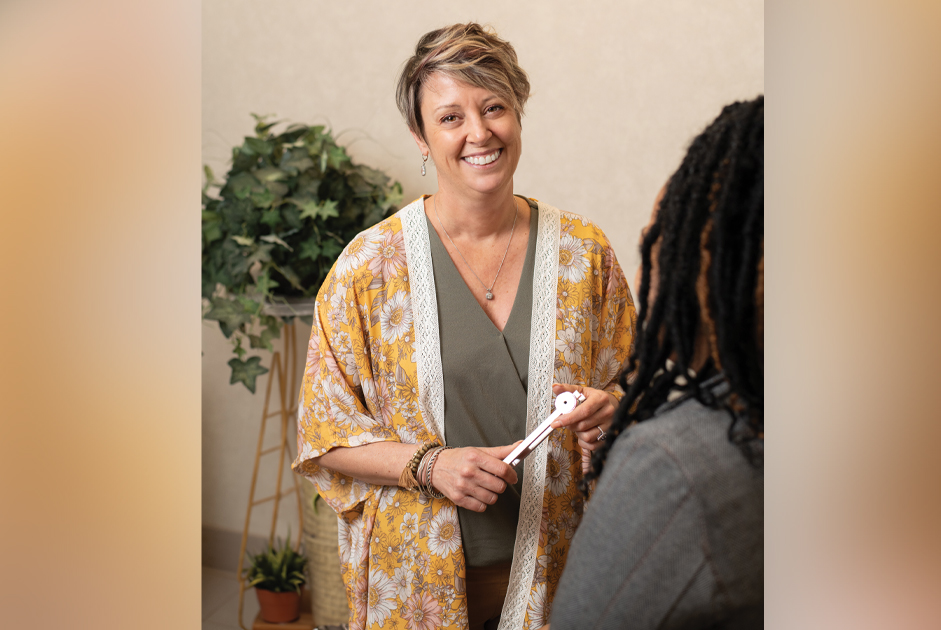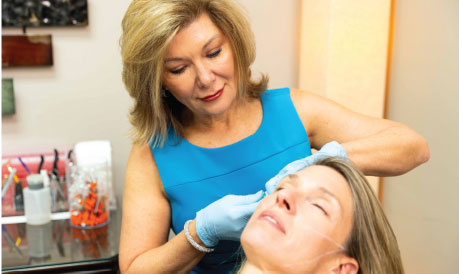If you suffer from a pelvic floor disorder (PFD), or you’re experiencing symptoms and not quite sure where to turn (yes, it can be a sensitive subject!), the caring staff at Lyndhurst Gynecologic Associates is there to help you create a treatment plan that can literally change your life.
The Lyndhurst Urogynecology Center team includes physicians and nurses with specific expertise and training to evaluate and treat all pelvic floor disorders, providing the most up-to-date and comprehensive programs to maximize your improvement.
Dr. Brad Jacobs, a board certified urogynecologist, says many women are relieved to find that the practice offer treatments that are less invasive than they imagined, including multiple non-surgical options for the management of all PFDs. However, if and when surgery is the best option, the team will walk patients through the process step by step.
November is Bladder Health Month and Pelvic Floor Rehab Month, and a perfect time to learn more about pelvic floor disorders, and educate women on what’s really going on inside their bodies. Most commonly, PFDs result in loss of urinary control, prolapse of the pelvic organs, and/or accidental bowel leakage.
Of women age 20 and above, 25% suffer from pelvic floor disorders, which occur due to the weakening or damage of the pelvic muscles, or sometimes even tears in the connective tissue. The pelvic floor itself includes the muscles, ligaments, and connective tissue in the lowest area of the pelvis, and its weakened state can affect your bladder, uterus, vagina, and bowel.
Pelvic floor disorders can also be a cause of sexual dysfunction, including reduced arousal, lack of orgasm, and painful intercourse – symptoms that are often difficult to discuss. For women of all ages who fight these symptoms, it’s no secret this area of the female anatomy supports many other necessary organs, including their position and overall function.
While research continues on the specific factors that contribute to PFDs in women, and the PFD Research Foundation funds scientists and researchers who study the conditions, there are also many known causes and contributors, which the trio of physicians in the Urogynecology department at Lyndhurst Gynecologic Associates shares below:
- Childbirth often contributes to the onset of a PFD, as delivery itself puts an enormous strain on the pelvic floor during delivery. Naturally, the rate is higher with vaginal births, as opposed to C-sections.
- As women age, the pelvic floor muscles also weaken, especially during menopause, leading to POP, or pelvic organ prolapse, where the pelvic organs actually drop from where they are normally located.
- For overweight women, there will always be more pressure on the bladder and, in turn, weaker pelvic muscles. (Yes, nutrition plays a role as well, and caffeine and alcohol can often irritate the bladder!)
- Sports injuries, repetitive physical activity, or other ailments that affect the nerves – including diabetes, Parkinson’s disease, strokes, certain back surgeries and spinal conditions, or even childbirth – can cause weakness in the pelvic floor muscles.
- Genetics and race also play a role in your chances to develop PFDs; it can be an inherited trait from your mother, as Caucasian females tend to develop the issue of urine leakage due to coughing, sneezing, or athletic activities, while African American women find their urinary leakage is more often related to urgency.
Fortunately, Lyndhurst Gynecologic Associates offers pelvic floor rehabilitation, a group of non-surgical treatments designed to assist women in regaining strength, control, and function of their pelvic organs. Lyndhurst’s certified staff specializes in pelvic floor rehab. They are able to gauge the strength of a patient’s muscles via neuromuscular and pressure studies, which guide these trained physicians in creating customized programs for each individual patient. A successful program – which includes dedication to attending regular appointments, daily exercises done at home, and making dietary choices and other lifestyle changes – can help patients see benefits relating to urinary incontinence, overactive bladder, pelvic organ prolapse (POP), and general pelvic pain. Ninety perfect of patients see significant improvement or even complete cure without the need for surgery.
On Thursday, November 8, from 5:30 p.m. – 7 p.m., Lyndhurst Gynecologic Associates will host an evening of education and discussion entitled “Break Free from Pelvic Floor Disorders” at their offices at 111 Hanestown Court, just off Stratford Road, in Winston-Salem. Reach them at 336-765-9350 to register for this event or for information on all other obstetric and gynecologic needs, or visit lyndhurstgyn.com,






















